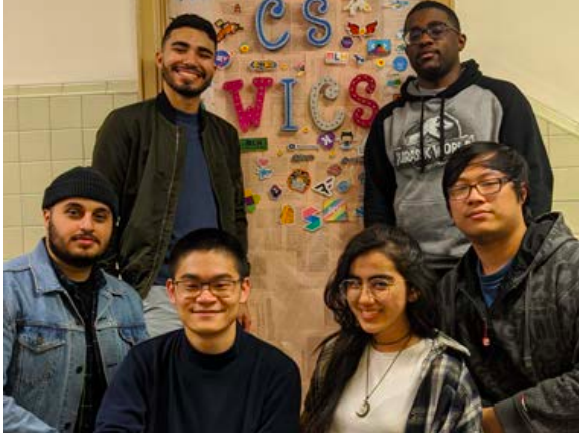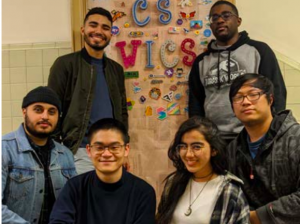

Carway, Junninho Thomas. Bottom row (l-r): Unis Gabbar, Kevin Tam, Shahzoda
Davlatova, Vincent Xie. / Quiara Vasquez
“Computer science students are the second largest major on campus.” This is the point that Shahzoda Davlatova, president of the Computer Science club seems to belabor and repeat to her team a million times a day. It’s to the point where, as the saying leaves her lips, her teammate across from her literally echoed it, barely above a whisper but down to the tee. It’s a point that the team behind Brooklyn College’s first ever hackathon fully understands and helps land the magnitude of the effort that these students have miraculously willed into existence. Rather than a point of pride, for this group, that fact is a catalyst to motivate change.
Hack Brooklyn, a student-led hackathon being held by the Computer Science club, the Women in Computer Sciences club, and the Engineering club at BC, is finally coming together at the end of the month on Mar. 29, and aims to give BC CS students an opportunity they may have not had before. “I wish there were more resources for computer science students here,” Davlatova said, speaking to the lack of resources the major has available for its students compared to other schools.“They have maker spaces, which is like this place where people can use stuff to just prototype and build stuff…And our students can barely get a class. They can barely get a seat in a class,” she said. “Some students have to like take out loans to stay a semester behind because they couldn’t find seats.”
So with the fervor of their fellow students growing to a fever pitch and the desire to do more for their department, a group of students began talking about how a hackathon could possibly come to fruition. But to these students who have been talking about and preliminarily planning it since last summer, it seems crazy that it’s actually happening.
That’s at least partially due to the fact that planning of the event hasn’t always been the smoothest, especially at the outset. “We went to different people, we went to the department, we went to all like different offices and it sounded like it was kind of always getting sent somewhere else. And now that we’re in a place where it seems like this thing is, kind of like, snowballing on its own and now people are reaching out to us about it,” said Tyler Carway, the CS club’s treasurer and de-facto money man of the operation.
“You know what, let’s go to President Michelle Anderson’s office. Let’s see what we can do.”
This was the working plan the group had in the earliest stages, according to Rohma Khan, the secretary of the CS club, back when their biggest challenge was finding a space. A meeting with Anderson wasn’t in the cards, but they were redirected to Ron Jackson, VP of Student Affairs, who ultimately put them in touch with the director of the Student Center, MItzu Adams, who finally helped them lock down a space in WEB to host the event.
This effort alone though was time-consuming, taking up a lot of the time that the team had available to them during their finals week. In fact, they were even late to a class that week because of the meetings they were having for the hackathon space, though their professor was understanding. Nonetheless, as time has gone on, the operation has grown into one that needs the constant involvement and attention of the students taking it on. This spoke to a larger notion that puzzled me the whole time I spoke to the group, though: How is it that with a major that big, the school never planned and hosted their own hackathon?
“I don’t know if it was just in their radar to do a hackathon. I think there’s always been some disconnect between faculty and students,” Davlatova said. While this may sound like a source of conflict, it’s been revelatory and a game changer for the students running the show. Between even the few members I spoke to, there’s a lot of shared hackathon experience. Vincent Xie, the VP of the CS club, who manages logistics, floor planning and scheduling has been to upwards of thirty hackathons. “A lot of the hackathons that I go to and the ones that are really ran really well are usually ran by students because the students know what the students want,” said Xie.
This has led to a committee where it isn’t believed that “students should ever be out of the decision, the loop of, the discussion of the hackathon,” according to Davlatova. And because of the considerations being taken to include students heavily in this already student-led operation, on paper, this event seems to be promisingly different. Take the timing of it, for example.
The hackathon taking place on a Sunday over the course of twelve hours was a very carefully selected aspect of the plan. Davlatova mentioned the typical 24-hour run of a hackathon made her attendance less likely because of her family and culture. Refusing to let anything get in the way of attendance, the event is taking place on a Sunday in order to sidestep Muslim students who would be praying on Friday or Jewish students who would be barred because of observation of Shabbat. This is all in an effort to champion the diversity Brooklyn College proudly touts and doubles as a rejection of the crowd these affairs typically draw.
The effort seems to be paying off. Despite the uphill battle that it’s been for the planning group to make concessions and essentially throw the biggest event the major has ever seen, it’s attracting more attention than they might’ve expected. After putting together sponsorship packages and reaching out to companies through alums, the event has attracted companies that have never even been on campus like LinkedIn and Etsy, as well as more traditionally tech-oriented companies like Google. Turns out that leveraging potential hires to these companies makes them show up and show out. “The thing about the tech industry is that they’re always looking for people but they can’t fill enough spots,” Xie said.
At the end of the day, the crew seems proud of their work. They also seem aware of how radically they’re changing things for the future of the major. “We definitely want to have this be continued. We don’t want this to be the only hackathon,” Rohma said. “This is my legacy, almost, and then I’m leaving it and then hopefully I, you know, we get to help people do better and get more resources than we did.” Because of this, they’re already prepping the next potential e-board members to continue what they hope becomes a tradition that makes “sure that CUNY students can go further. Brooklyn College specifically can see companies come on campus and want to recruit them.”
“The hope for this is there is an active tech community, there’s more resources, more companies and the retention rate for women and minorities are higher. For me, what got me into tech was hackathon,” Davlatova said. “I know it’s a game changer. I know it could be a game changer for so many more people.”
